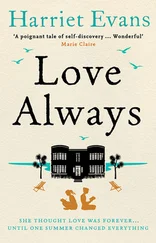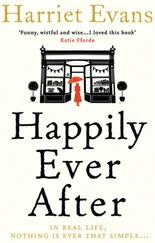Harriet Evans - Love Always
Здесь есть возможность читать онлайн «Harriet Evans - Love Always» — ознакомительный отрывок электронной книги совершенно бесплатно, а после прочтения отрывка купить полную версию. В некоторых случаях можно слушать аудио, скачать через торрент в формате fb2 и присутствует краткое содержание. Жанр: Старинная литература, на английском языке. Описание произведения, (предисловие) а так же отзывы посетителей доступны на портале библиотеки ЛибКат.
- Название:Love Always
- Автор:
- Жанр:
- Год:неизвестен
- ISBN:нет данных
- Рейтинг книги:3 / 5. Голосов: 1
-
Избранное:Добавить в избранное
- Отзывы:
-
Ваша оценка:
- 60
- 1
- 2
- 3
- 4
- 5
Love Always: краткое содержание, описание и аннотация
Предлагаем к чтению аннотацию, описание, краткое содержание или предисловие (зависит от того, что написал сам автор книги «Love Always»). Если вы не нашли необходимую информацию о книге — напишите в комментариях, мы постараемся отыскать её.
Love Always — читать онлайн ознакомительный отрывок
Ниже представлен текст книги, разбитый по страницам. Система сохранения места последней прочитанной страницы, позволяет с удобством читать онлайн бесплатно книгу «Love Always», без необходимости каждый раз заново искать на чём Вы остановились. Поставьте закладку, и сможете в любой момент перейти на страницу, на которой закончили чтение.
Интервал:
Закладка:
PART TWO
July 1963
Chapter Twelve
‘So, what time does Louisa’s new boyfriend get here?’
‘He’s not my boyfriend, shut up, Cecily.’
‘He is! You’re going to kiss him on the lips! And Miranda’s never kissed anyone before. Doesn’t that make you feel sick with envy, Miranda?’
‘Honestly, Cecily, you’re such a baby. You’re fifteen. When are you going to grow up?’
‘Poor Wardy. It doesn’t look good for him. Filthy old bugger. I say, Archie, have you read this morning’s Times ?’
‘I went straight to that page, natural y. I must say, she’s a real goer, that Keeler girl. No better than . . . Wel , anyway. Fruity stuff, isn’t it?’
‘You’re disgusting, Archie.’
‘Louisa, don’t talk about my brother like that.’
‘I wil . He’s completely disgusting, and he knows why.’
‘Why, what do you mean? What’s fruity?’
A melodious voice spoke from the end of the table. ‘Jeremy, Archie, please. Not at breakfast.’
‘Sorry, Franty. It’s nothing, Cec. Have you got the lime marmalade? Jol y nice stuff, Franty.’
‘Thank you, Jeremy.’
* * *
I’m going to scream. I’m going to scream. Yes, I am.
Frances Seymour looked around the room, trying to keep calm.
Lately, the old feeling had started to come back. She had kept it at bay for many years now, she had thought the house in Cornwal was the answer, but increasingly it was as if she was not in control: of her children, of her home, of her own mind. She wished she were anywhere but here, presiding over breakfast with this loud, mucky troupe of young people, being the grown-up, sensible one. It was wrong.
There was a lot on. Too much, perhaps. She had a portrait of her youngest daughter, Cecily, to finish, for a big upcoming show in London. She had three teenagers of her own, two more staying with her, and two more on their way at this very minute, as wel as a husband who didn’t care whether you looked after him or not; she had once found Arvind absent-mindedly chewing a piece of paper, and when she’d asked him why he’d said, vaguely, ‘I was hungry. I thought I would try the paper. I don’t need it any more.’
The neighbours had just arrived for the summer, she should visit them, and the damn church fete was the week after, and Mary kept asking her what she wanted her to make. Didn’t the woman realise she didn’t care? She simply didn’t bloody care?
Frances pressed a cool hand to her forehead. Then the Mitchel s were coming to stay the week after, she’d have to get a fun crowd up for them, lots of booze in, Eliza needed constant entertaining and young men to look at. The crowds were descending; only a few days before the children came back from school she’d just said goodbye to a huge party, some old friends from art col ege, Arvind’s publisher and two couples from the old Redcliffe Square days. She loved entertaining, loved seeing old faces, loved the praise, the company, the conversation, the stimulation
– Frances had to be stimulated in order to be able to paint. She couldn’t do it unless there was something burning within her, stoking her thoughts, firing her up.
And yet daily life had to go on too, and she was the one who made it go on. There was Cecily and Miranda’s room to turn out – Cecily had grown so fast this last term, there was plenty the clothes stal could have. She needed to take them both into Penzance, or maybe even Exeter, to get some new clothes; Mary never got it right. Cecily could have Miranda’s cast-offs, but Frances, a younger child herself, always thought it was unfair she never had anything new, she deserved a party frock of her own, some shorts, a few summer shirts.
She frowned again and looked at Miranda, wondering where she’d got that rather nice cream linen top she was wearing; had she seen that before? It suited her; that in itself was unusual, Frances thought, and then felt guilty.
I don’t care about their damn clothes.
There had been a time when she had worn new clothes, put her hair up, slipped into satin heels, nursed a glass of champagne as she laughed with handsome young men at the Chelsea Arts Club, or drank long into the night in some underground shelter, thick with cigarette smoke. There had been a time when she was young, desirable, with the world at her feet, and now . . . She sighed. She had become staid. Boring. Ordinary . A staid wife and mother of three, a painter of staid, boring, repetitive landscapes. And so the old furtive unrest was beginning to creep over her again.
‘Leave me alone !’ Miranda squawked loudly. Frances looked up, startled, as Cecily smirked in triumph at some childishly won point and Miranda slumped back down against the high-backed dining chair. Across the table, Arvind carried on eating his kipper, staring into space as if he were alone.
Frances smiled at him, but he didn’t see. He never saw. That was one of the things for which she had always loved him. Arvind wasn’t suspicious. He wasn’t trusting either. He was just in another world most of the time, and they worked wel together because of it. Frances could stil remember the first time she saw him, at that concert in the National Gal ery, quiet and neat in his tweeds, impervious to everything else around him except the music, his short frame tensing at the swel ing rhythm of the piano. She had smiled slowly at him, but he had focused shortly on her and then back on the music again, looking straight through her as if she weren’t there. In years to come, Frances would always wonder if that was when she was hooked: he’d looked past her, not at her. She wasn’t used to that.
She watched him now, her gaze flicking from him to their son Archie, a young Louis Jourdan: beautiful y turned out, his hair careful y combed, his shirt immaculate. He made her uneasy though. She didn’t . . . what was it? She didn’t trust him? Her own son? He was peeling his apple, oh so precisely, with a smal knife, looking as if butter wouldn’t melt. There was something going on behind that charming smile; Frances didn’t know what. Why was Louisa so furious with him? What had he done this time? Was it the old problem again? Or was it he and Miranda, up to mischief?
Miranda – Frances sighed. Miranda was being particularly vile at the moment, and she didn’t know what to do. She never knew what to do with her.
She had been such a cross baby. She was thin and fed badly, a tiny, hairy thing, feet turned outwards, like a little monkey, her expression always stormy, and from the moment she could walk her posture was almost comical in its teenager-gait: defensive, shoulders hunched, eyes glaring and, years later, she had barely changed at al . The funny thing was that Frances, with her painter’s eye, could see that Miranda had an idiosyncratic kind of beauty al her own. She was gamine, boyish, her eyes were startlingly intense and her dark, beautiful skin glowed. When she laughed her face lit up, but she seldom did, except with her twin Archie.
Since Miranda had got back from her final term at school she’d been even worse than usual, Frances thought. She had no plans, unlike Archie who was staying on at school for an extra term to take his Oxbridge exams. Miranda was trying to drag him down, Frances knew it. She had taken A-levels, but wasn’t expected to make any mark on them. She was always saying how much she loved clothes, and fabrics – Frances was sure it was true, but to what end? That wasn’t a job . The one thing Miranda had expressed any interest in, only the day before, was a finishing school in Switzerland. Should they send her off again, pay some elite establishment to round off her rough edges a bit? She could certainly benefit from it, but Frances loathed the idea, it was so . . . oh, just ghastly. So suburban!
Читать дальшеИнтервал:
Закладка:
Похожие книги на «Love Always»
Представляем Вашему вниманию похожие книги на «Love Always» списком для выбора. Мы отобрали схожую по названию и смыслу литературу в надежде предоставить читателям больше вариантов отыскать новые, интересные, ещё непрочитанные произведения.
Обсуждение, отзывы о книге «Love Always» и просто собственные мнения читателей. Оставьте ваши комментарии, напишите, что Вы думаете о произведении, его смысле или главных героях. Укажите что конкретно понравилось, а что нет, и почему Вы так считаете.












